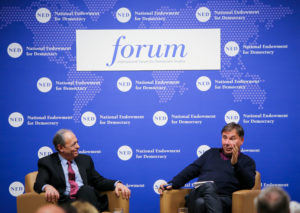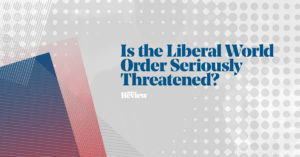 The only way for the European Union to survive as a liberal actor in an increasingly illiberal environment is by transforming itself from a missionary who wants to shape the world in his own image, to a monastery that is focused on protecting the very exceptional nature of its political project, analyst Ivan Krastev writes in The Missionary Who Has to Become a Monastery, a policy paper for the Sofia-based Centre for Liberal Strategies (CLS).
The only way for the European Union to survive as a liberal actor in an increasingly illiberal environment is by transforming itself from a missionary who wants to shape the world in his own image, to a monastery that is focused on protecting the very exceptional nature of its political project, analyst Ivan Krastev writes in The Missionary Who Has to Become a Monastery, a policy paper for the Sofia-based Centre for Liberal Strategies (CLS).
Was Western involvement in the so-called color revolutions in the post-Soviet space simply idealistic democracy promotion or rather a mere expansion of the West’s sphere of influence? That was one of the questions raised by the project, “Hypocrisy, Anti-Hypocrisy and International Order: The Dilemmas of Liberal Power in the 21st Century,” initiated by the CLS with the support of the Robert Bosch Stiftung and Charles Stewart Mott Foundation, which addressed not only the West’s alleged policy of double standards but also criticism of the West’s hypocrisy as an ideological basis for attacking the postwar liberal order.
 The post-Cold War version of the liberal order was characterized by four basic assumptions, none of which were, until recently, contested by the major powers, notes Krastev, a regular contributor to the National Endowment for Democracy’s Journal of Democracy:
The post-Cold War version of the liberal order was characterized by four basic assumptions, none of which were, until recently, contested by the major powers, notes Krastev, a regular contributor to the National Endowment for Democracy’s Journal of Democracy:
- free trade is beneficial and economic interdependence is a source of security;
- individuals have rights simply by the fact of being human;
- democracy is as distinctive a feature of our world as air travel and the Internet;
- existing international institutions provide a functional framework for resolving disputes about trade and politics without the use of force.
All those four assumptions are now in question. They have been challenged intellectually and politically by states within and outside the West, he adds.
 While Greeks and Turks are mostly outraged by the selective nature of West’s interference in defense of democracy or the EU’s financial rules, the Kremlin resents the West’s use of liberal rhetoric for cover of its geopolitical interests. With the passing of time both Moscow and Ankara have challenged the very claim of the West to present a universal norm that others should follow, Krastev observes:
While Greeks and Turks are mostly outraged by the selective nature of West’s interference in defense of democracy or the EU’s financial rules, the Kremlin resents the West’s use of liberal rhetoric for cover of its geopolitical interests. With the passing of time both Moscow and Ankara have challenged the very claim of the West to present a universal norm that others should follow, Krastev observes:
The hypocrisy of Western leaders, lecturing the world about high-minded values while
actually being motivated by selfish geopolitical interests, has become one of Russia’s
gnawing obsessions. The so-called “liberal international order,” in Moscow’s view, was
nothing nobler than a projection of America’s will to dominate the world. Western
universalism was just a false front for Western particularism. America, in particular,
disguised the enlargement of its sphere of influence as an expansion of the frontiers of
freedom. What the West celebrated as popular democratic revolutions were simply
Western-sponsored coups d’état.
“While anti-hypocrisy rhetoric has its legitimate arguments,” Krastev concedes, one of the project’s major findings is “that the weaponization of anti-hypocrisy rhetoric is partially responsible for the current miserable state of international affairs.”
“There is a sharp distinction between exposing hypocrisy to uphold a value (what we saw in Greece) and exposing hypocrisy to destroy a value (what we saw in Russia),” he concludes. RTWT







